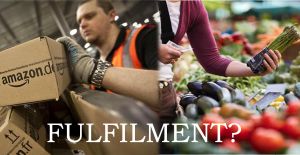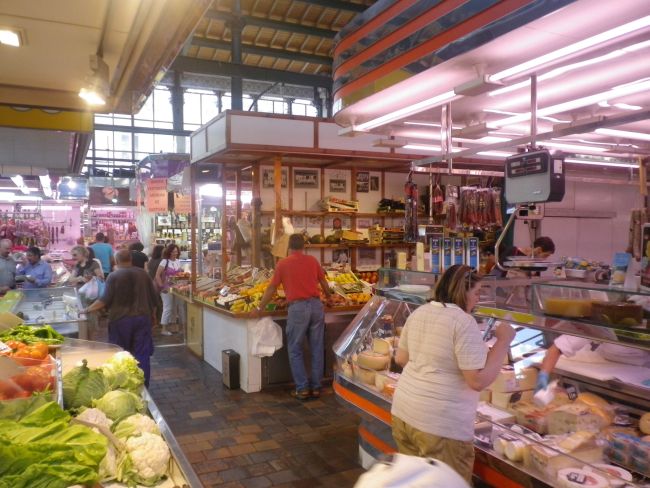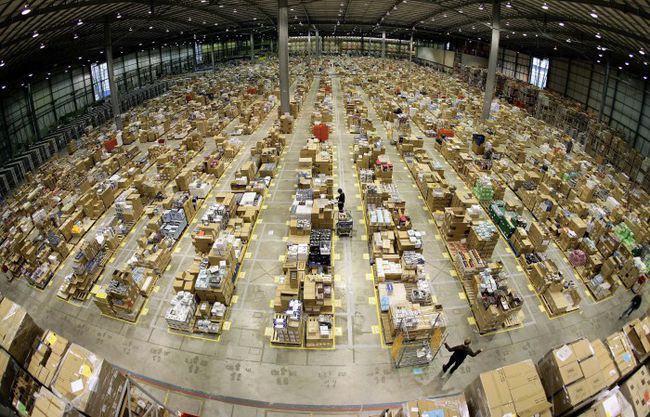26 Feb 2016
How Amazon debases our language, and how we can take it back.

The word ‘fulfilment’ has two distinct meanings. The first, according to the Cambridge Dictionary, is “the fact of doing something that is necessary or something that someone has wanted or promised to do”, and the second “a feeling of pleasure because you are getting what you want from life”. I like the idea of the second one, a life of fulfilment, it’s something we all aspire to, right? You might even argue that we long for fulfilment: at the very least it’s certainly what one might call a Good Thing.
Yet sadly, for many, the term ‘Fulfilment Centre’ doesn’t refer to somewhere with great cake where pleasure and “getting what we want from life” are available on demand, but rather to vast, disorientating, highly stressful working environments designed not to benefit local people or the local economy, but rather distant investors and shareholders, offering the allure of cheap stuff, much of which will end up in landfill within a few months.
The Guardian reported last week that there is great concern in the villages of Sevington and Mersham in Kent that a huge new development being planned on their doorstep is in fact going to be a vast Amazon ‘Fulfilment Centre’ (although Amazon deny this). The new development, which necessitates a new junction onto the M20, will receive £50 million in government funding, including £20 million from the Local Enterprise Partnership (LEP) (more of them in later posts). There is much uproar locally, with one councillor describing Amazon as practicing “the worst kind of corporate citizenship”. I would like to also accuse them of abuse of our fine language.
As regular readers here will be aware, when left to determine their own futures, local town economies, neighbourhood economies in urban areas, can be ‘fulfilment centres’ in the good meaning of the word, meeting their needs in the round, while doing so with virtually no public funding, and paying their taxes. For example, here in Totnes, a rare High Street where 80% of businesses are still independent businesses, I see a lot of fulfilment. I also see it in many other places, in vibrant, diverse, delicious, entrepreneurial high streets, in craft breweries, bakeries, food markets and much much more. As Julian Dobson wrote in ‘How to Save High Streets’:
“The best future for our town centres is not merely as places to buy, but as places to be; places where we can live and act as citizens rather than as consumers. Then they can be places where we rediscover local identity and community, where we can be more fully alive and more fully ourselves. As many a shopkeeper has said, why settle for less?”.
This reclaimed interpretation of the term ‘fulfilment centre’ offers a model of business with a deep sense of finding the right size, of working for a greater purpose, intimately connected to the idea of being a force for the reimagining and rebuilding of the local economy, for nurturing fulfilment, the exact opposite of what the taxpayer is subsidising to an eyewatering degree in Kent. If we get it right, we can create a model that also benefits public health, brings assets into community ownership, builds local resilience. Sounds pretty fulfilling to me.
In our Kentish ‘fulfilment centre’, the government would be gifting £50m of tax payers’ money to a company who raked in £5.3bn sales from online British shoppers last year, yet recorded a profit of just £34.4m and paid just £11.9m in tax. It is a model where that company then goes on to create poorly-paid jobs which make workers mentally and physically ill, and puts out of business the very small and medium sized enterprises that actually give that local economy its resilience and, yes, its fulfilment.

Alongside ‘fulfilment’, there are two other words that I think we need to wrestle back from the Amazons of this world:
- ‘Shift’ need not be a 14 hour, soul-destroying session in an artificially-lit warehouse order picking Jeffrey Archer novels and iPods, shift can also refer to “transfer from one position to another”, to see the world around us shifting, changing for the better.
- ‘Agency’: while agency can refer to the private company through whom people find the kind of work offered in our Amazon ‘fulfilment centre’, it can also refer to refer to “the subjective awareness that one is initiating, executing and controlling one’s own volition in the world”, in other words, that we can influence and affect the world around us.
What we try to do in the Transition movement, and in a huge array of emergent new economy movements and enterprises, is to support people to reconnect to their longing, to support them to shift, and to find their agency, and, as a result, as sense of fulfilment. Would £50m of public money poured into Amazon enable any of those things to happen? No. Quite the opposite.
We need to reclaim our local economies, and to challenge, as the wonderful Fair Tax Town movement is doing, a tax system that undermines resilient local economies and rewards predatory extractive industries like Amazon. But we also need to reclaim our language.
